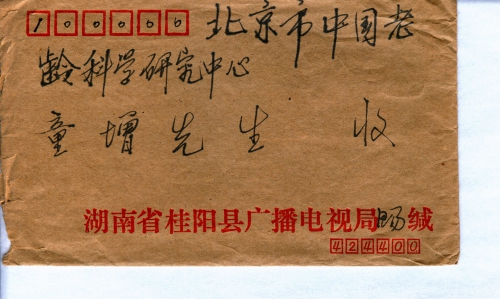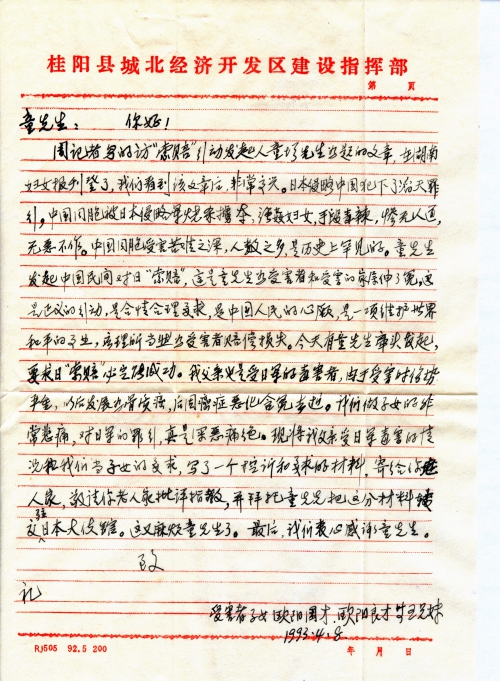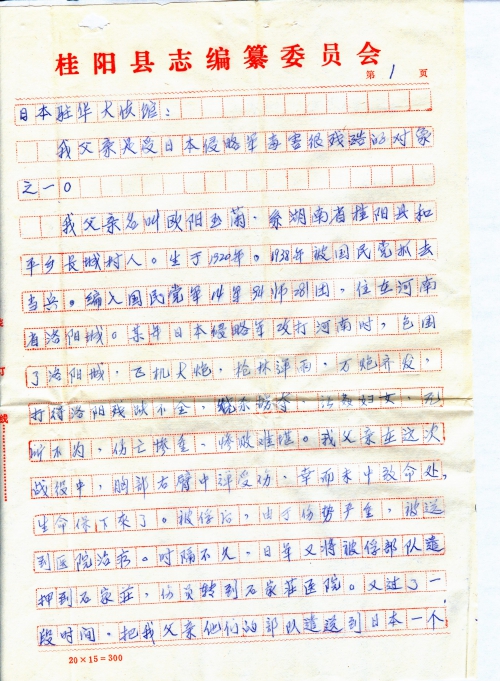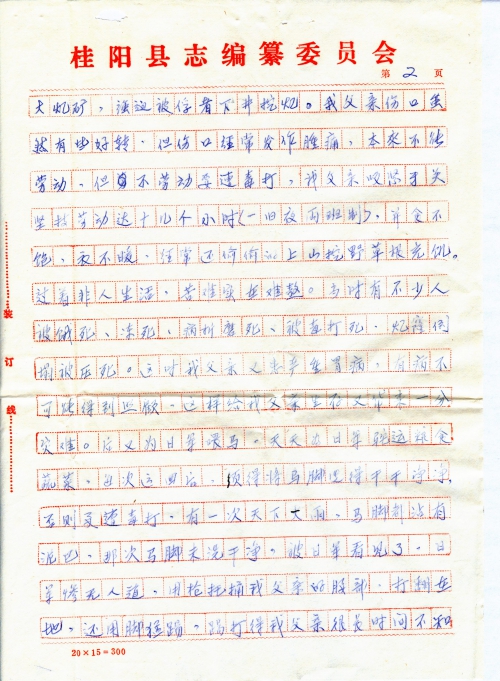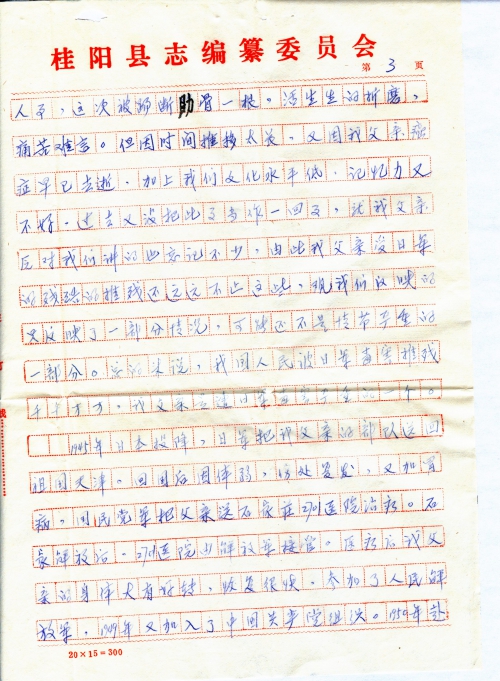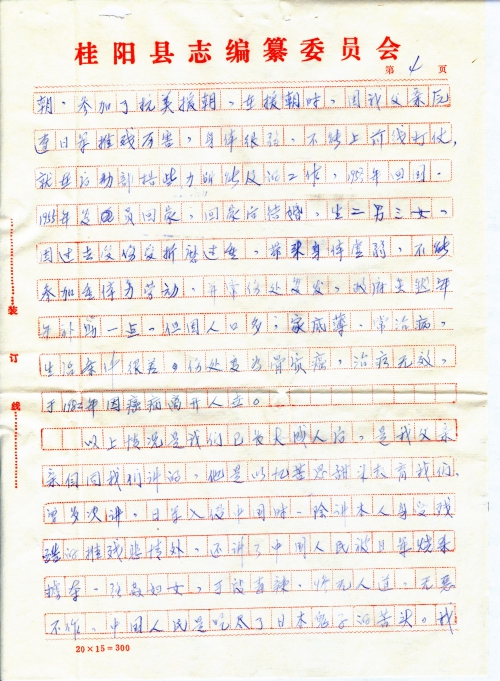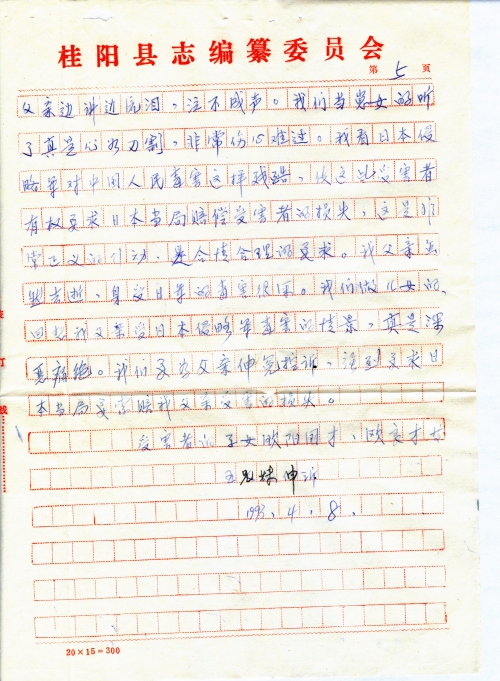Date of letter:1993-04-08
Address of author:Guiyang County, Chenzhou City, Hunan Province
Date of event:Not mentioned
Location of event:Not mentioned
Name of author:Ouyang Guocai, Ouyang Liangcai and their brothers and sisters, five people in total
Name(s) of victim(s):Ouyang Guocai’s father
Type of atrocity:Air Bombings, Slave Laborers(AB, SL)
Other details:My father Ouyang Yulan joined in the anti-Japanese war. When the Japanese invaded Luoyang City, Henan Province, aircrafts were sent to bomb the city and my father was captured after being wounded, sent to do labor work and suffered from beatings.
Mr. Tong:
Hello!
The article written by Reporter Zhou on an interview with Mr. Tong Zeng, the initiator of “Compensation Claim” campaign was published on Hunan Women’s News. We were very glad upon reading the article about Mr. Tong Zeng’s campaign. Japan has committed such horrendous crimes against the Chinese during its invasion into China. They used all sorts of extremely heinous ways beyond imagination to burn, kill, loot, and rape wherever they roam. The severity of suffering and the staggering number of Chinese victims are hard to find in human history. The “Compensation Claim” by Chinese private citizens initiated by Mr. Tong is a righteous move in the name of justice, for by this action Mr. Tong aims to redress the grievances for victims and their family members. It will be the fulfillment of strong wishes of millions of Chinese people, an undertaking to safeguard world peace, and an irrefutable humanity request. The “Demand for Compensation” initiated by Mr. Tong today will surely succeed. My father is also a victim of the Japanese army. Due to serious injuries that later evolved into Osteoid cancer, my father eventually died of cancer. Deeply distressed and loathed at the war crimes of the Japanese Army, we as his children hereby composed a testimony and claim document detailing our father’s persecution by the Japanese army, and mail it to you. We look forward to your comments and guidance. We also ask you to kindly forward this document to the Japanese Embassy. Sorry to bother you. Our heart-felt thanks and appreciations.
Regards
Yours faithfully
Victim’s children Five siblings including Ouyang Guocai, Ouyang Liangcai
1993.4.8
The Japanese Embassy in China:
My father is one of the people who suffered the cruelest atrocity from the Japanese Invasion Army.
My father’s name is Ouyang Yulan, a native of Changcheng Village, Heping Town, Guiyang County, Hunan Province. He was born in 1920. In 1938 he was drafted by the ruling Nationalist government to join the Chinese army, and was assigned to 281st Regiment, 94th Division of the 14th Army of the KMT Army. His regiment was stationed in Luoyang, Henan Province. In one year, when the Japanese Army attacked Henan, they surrounded Luoyang and showered it with aircrafts bombs, canon shells,, and hailstorms of bullets. As Luoyang was damaged beyond recognition, the Japanese army burned, killed and looted, raped women, and stopped at nothing, whereas the Chinese side suffered heavy casualty and humiliating defeat. In this battle, my father was wounded in the chest and right arm. Fortunately there was no fatal wound, and he survived. After being captured by Japanese army, due to severe injury, he was sent to a hospital for treatment. Soon afterwards, the Japanese Army escorted the prisoners of war to Shijiazhuang, where the wounded were transferred to Shijiazhuang Hospital. After some time, they sent my father’s troop to a large Japanese coal mine, and forced the POWs to dig coal in the mine. Although my father’s wounds had recovered somewhat, they were still often swollen and painful, and therefore he was not at all in the condition for physical labor. But since any POW who failed to work would be beaten, so my father gritted his teeth and continued working for over one dozen hours a day (two shifts in one day and night). With meager food and insufficient clothing, he often secretively went up the hills to dig and eat grass roots to survive. Under such inhuman condition, the hardship was really unbearable. Many fellow inmates were starved to death, frozen to death, tortured to death, beaten to death, or crushed to death in various coal mine accidents. My father developed serious stomach illness, but received no treatment and care. Then another calamity stroke — my father was put to care for the cargo horses for the Japanese Army. After each delivery of grains and vegetables, he must wash the horse legs totally clean, otherwise he would receive severe beating. Once it was raining so heavily that the horse legs were splashed with lots of mud that were hard to clean up thoroughly. As the Japanese soldiers found the residual mud, they brutally hit my father’s waist with rifle stock. As my father collapsed to the ground, the Japanese soldiers continued kicking my father until my father lost consciousness for a long while. As a result of this beating, one rib of my father’s was broken. This was just a glimpse of the ongoing living torture, painful beyond description. Owing to the passage of time and my father’s early death by cancer, plus our lack of education and poor memory, we might have forgotten a lot of what my father had told us, for back then we didn’t considered what he said very seriously. It is evident that my father’s suffering by the Japanese Army might be far more than what we now can remember. What we are documenting here might not be the most serious part, but rather a small part of the whole. In summary, it would be no exaggeration that among millions of Chinese victims of the atrocity of the Japanese army, my father was among the severest cases.
Upon its surrender in 1945, the Japan sent my father’s troop back to Tianjin. After his returned, he became very weak, aggravated by the relapsed wounds and worsening stomach disease. The government sent my father to Shijiazhuang 2701 Hospital for treatment. After Shijiazhuang was liberated by the Communists, the 2701 Hospital was taken over by the Liberation Army. After receiving medical treatment, my father’s physical condition improved greatly, and recovered very quickly. He joined the People’s Liberation Army. In 1949 he joined the Communist Party of China. In 1950 he was dispatched to Korea and took part in Korean War. During the Korean War period, because of the horrible abuse as a forced slave laborer by the Japanese Army, he was too weak to combat in the frontline. He was assigned to the Logistics Department to do some work within his ability. In 1953 he returned to China. In 1955 he was discharged from the military and returned to hometown and subsequently got married. He then had three sons and two daughters. Because of his suffering from heavy torture as a slave laborer, he was too weak to take part in heavy physical labor, and often his old wounds would relapse. Despite some subsidy from the government each year, due to the large number of people in our family, little family assets, frequent medical treatments, and poor living condition, the wounds later evolved into Osteoid cancer, which defied treatment, and he passed away due to cancer in 1982.
We learned of the above info from my father after we became adults. He educated us with past sufferings to remind us to treasure the good times, and repeatedly mentioned that when the Japanese army invaded China, in addition to his personal torture and persecution, he had also witnessed how the Japanese army burned, killed and looted, raped women. They were ruthless, brutal and inhuman, and absolutely evil. They have inflicted tremendous suffering on the Chinese people. My father would shed tears when talking, and choked with sobs. When we heard his talking, we were devastated as if our hearts were pierced with knifes. In my view, since the Japanese Invasion Army had committed such extreme atrocity toward the Chinese people, these victims are fully entitled to demand the Japanese government to compensate for the victims’ damages. This is an absolutely righteous action and is fully justified. Although my father has passed away, his profound suffering remains to be redressed. As his children, every reminiscence of my father’s suffering in the hands of the Japanese invasion army would conjure intense disgust and bitter hatred. We vow to publicize the grievance and injustice for our father, and strongly demand the current Japanese government to compensate for my father’s damage.
Children of the victim: Five siblings including Ouyang Guocai, Ouyang
Liangcai
1993.4.8














